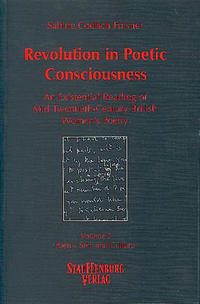
Revolution in Poetic Consciousness is a considerable and groundbreaking piece of work. It provides a most substantial, perceptive, and well-informed account of a neglected body of English poetry from the middle years of the twentieth century. Starting from the hypothesis that an excessive concern with movements, schools and literary generations has generated maps of English poetry from which important and interesting poets – especially women poets – have been effaced, Revolution in Poetic Consciousness recovers, situates and re-situates a lost and undeservedly ignored generation of writers in the poetic landscape between 1938 and 1965: Frances Bellerby, Lilian Bowes Lyon, Frances Cornford, Phoebe Hesketh, Elizabeth Jennings, Kathleen Nott, Ruth Pitter, Kathleen Raine, Anne Ridler, E.J. Scovell, Edith Sitwell, Stevie Smith, Dorothy Wellesley, and Sheila Wingfield. For the purpose of reading these poets, a new typology of poetic categories (types of ethos, modes, voices) is evolved, which is disturbingly relevant to both genre theories and current discussions of the self. Revolution in Poetic Consciousness won the Kardinal-Innitzer Förderungspreis 2001. Volume II: Poetic Consciousness and Lyrical Expression focuses on the ethos of interiority (divided into the pastoral mode and the autobiographical mode), and the ethos of the numinous (divided into the archetypal, Christian, and epiphanic modes). The readings of Bellerby, Cornford, Jennings, Pitter, Raine, Ridler, Scovell, and Wellesley in accordance with these categories are extensive, lucid and discriminating and supported by material from Coelsch-Foisner’s own interviews and correspondence, from broadcasts, handwritten documents, and from a rich body of reviews collected in special archives and never brought together in this wealth.